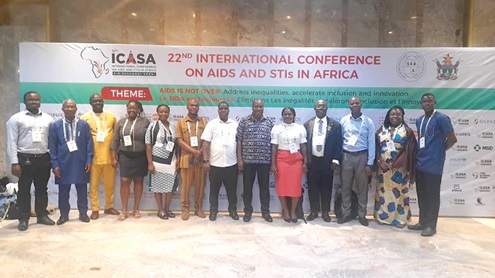
22nd AIDS conference in Africa underway in Harare
The 22nd International Conference on AIDS and STIs in Africa (ICASA) is underway in Harare, Zimbabwe.
Advertisement
The conference which began yesterday, is on the theme: AIDS is not over: Address inequalities, accelerate inclusion and innovation.
More than 8,000 delegates both in person and virtually are attending the event, the largest international conference on HIV/AIDS in Africa.
The President of Zimbabwe, Emerson Mnangagwa, was in attendance.
Ghana's delegation, which is led by the National AIDS/STIs Control Programme (NACP), included the Ghana Office of the World Health Organisation (WHO), the Ghana Health Service, the Ghana AIDS Commission and JSI Care Continuum project who would address some of the sessions.
Objectives
The President of ICASA, Dr Pagwesese David Parirenyatwa, said the objectives of the conference was encompassed not only to address HIV, but also related diseases such as tuberculosis, hepatitis, malaria and other infectious diseases.
The conference, which would end on Saturday, December 9, 2023, would also mainstream respect for equality, inclusion and diversity in the control and mitigation of the impact of diseases; respond to HIV/AIDS, COVID-19, Monkey pox, Ebola and any other emerging disease, as well as mitigate the impact of hepatitis, tuberculosis and malaria through strengthening of health systems.
It would also focus on the reality that a significant portion of HIV-related programmes had historically relied on external donors rather than governments.
He also acknowledged that fewer than 10 per cent of the 55 African Union members who pledged under an Abuja declaration to allocate 15 per cent of their annual budget to enhance the health sector were fulfilling that commitment.
"It is crucial for Africa to come together and develop the capacity to produce vaccines.
The contribution of Africans in the diaspora who have played significant roles in producing COVID-19 vaccines hold great promise for improving our healthcare systems and eventually eradicating AIDS from our continent by 2030," the president said.
Progress in Zimbabwe
The Minister of Health and Child Care of Zimbabwe, Dr D. T. Mombeshora, said the country was among those with a high burden of HIV, but that through deliberate political commitment and sustained implementation of high impact interventions, they had recorded some progress in ameliorating the burden.
"The HIV incidence is currently at 0.17 per cent while prevalence is at 11 per cent. Of the 1.3 million people living with HIV, more than 1.2 million are on treatment.
“Despite setbacks related to COVID-19, the response has recovered and is expanding in line with the goals of Zimbabwe’s national development strategy of ending AIDS by 2030," he said.
Representatives of partners such as WHO and the UNFPA also addressed the conference.




